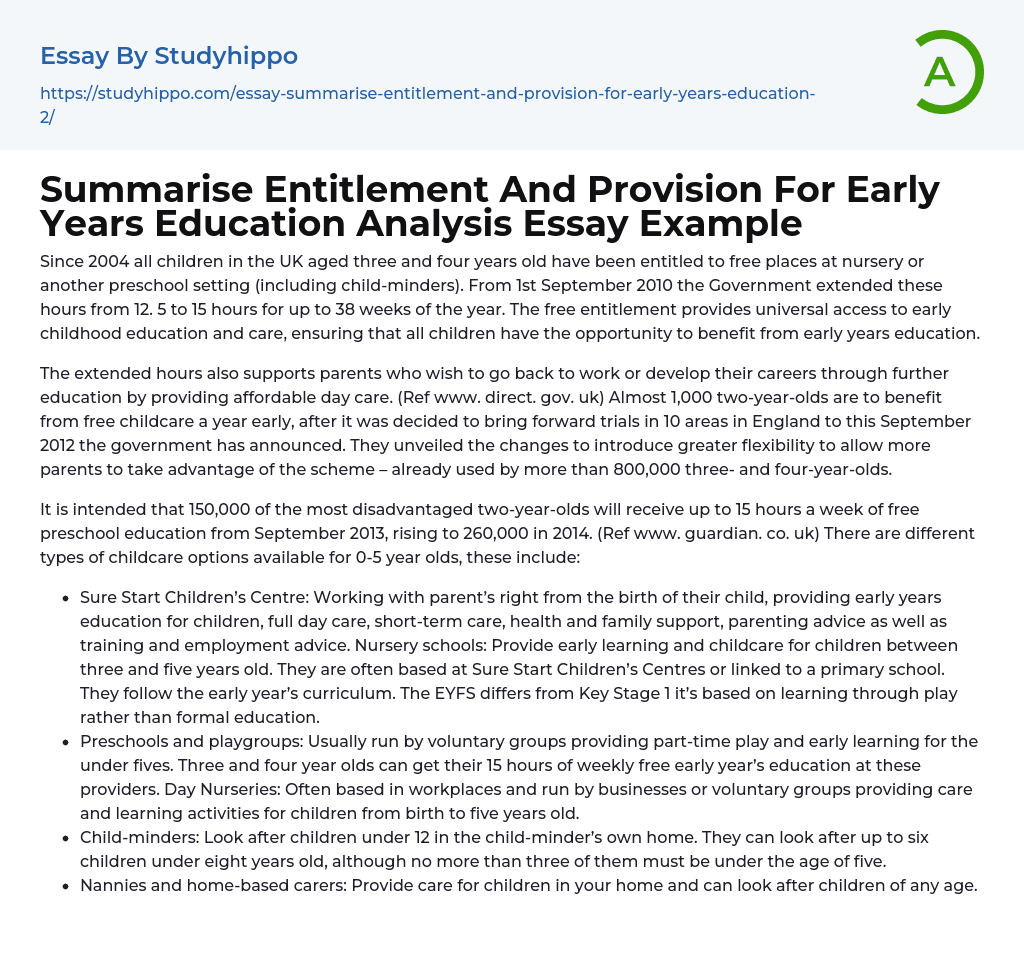

Summarise Entitlement And Provision For Early Years Education Analysis Essay Example
Since 2004 all children in the UK aged three and four years old have been entitled to free places at nursery or another preschool setting (including child-minders). From 1st September 2010 the Government extended these hours from 12. 5 to 15 hours for up to 38 weeks of the year. The free entitlement provides universal access to early childhood education and care, ensuring that all children have the opportunity to benefit from early years education.
The extended hours also supports parents who wish to go back to work or develop their careers through further education by providing affordable day care. (Ref www. direct. gov. uk) Almost 1,000 two-year-olds are to benefit from free childcare a year early, after it was decided to bring forward trials in 10 areas in England to this September 2012 the government has announced. They unveile
...d the changes to introduce greater flexibility to allow more parents to take advantage of the scheme – already used by more than 800,000 three- and four-year-olds.
It is intended that 150,000 of the most disadvantaged two-year-olds will receive up to 15 hours a week of free preschool education from September 2013, rising to 260,000 in 2014. (Ref www. guardian. co. uk) There are different types of childcare options available for 0-5 year olds, these include:
- Sure Start Children’s Centre: Working with parent’s right from the birth of their child, providing early years education for children, full day care, short-term care, health and family support, parenting advice as well as training and employment advice. Nursery schools: Provide early learning and childcare for children between three and five years old. They
are often based at Sure Start Children’s Centres or linked to a primary school. They follow the early year’s curriculum. The EYFS differs from Key Stage 1 it’s based on learning through play rather than formal education.
- Childhood Memory essays
- Academia essays
- Higher Education essays
- Language Learning essays
- Studying Business essays
- Education System essays
- Study essays
- First Day of School essays
- Scholarship essays
- Pedagogy essays
- Curriculum essays
- Coursework essays
- Studying Abroad essays
- Philosophy of Education essays
- Purpose of Education essays
- Brainstorming essays
- Educational Goals essays
- Importance Of College Education essays
- Brown V Board of Education essays
- The Importance Of Higher Education essays
- Online Education Vs Traditional Education essays
- Academic And Career Goals essays
- Academic Integrity essays
- Brown Vs Board Of Education essays
- Distance learning essays
- Technology in Education essays
- Vocabulary essays
- Writing Experience essays
- Importance of Education essays
- Early Childhood Education essays
- Academic Degree essays
- Academic Dishonesty essays
- School Uniform essays
- Academic writing essays
- Cheating essays
- Bachelor's Degree essays
- MBA essays
- College Life essays
- Grade essays
- Diploma essays
- Phonology essays
- Sentence essays
- Filipino Language essays
- Pragmatics essays
- Millennium Development Goals essays
- History Of Education essays
- Graduate School essays
- Middle School essays
- School essays
- Special Education essays



